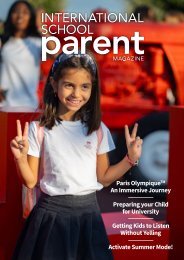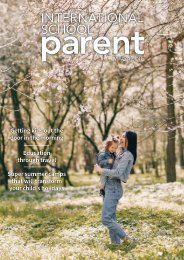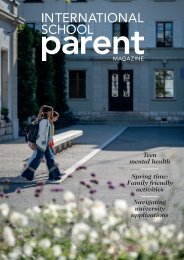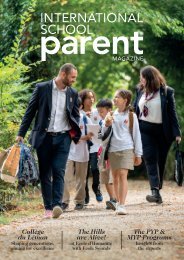International School Parent Magazine - Autumn 2019
- No tags were found...
You also want an ePaper? Increase the reach of your titles
YUMPU automatically turns print PDFs into web optimized ePapers that Google loves.
I struggle in school, I know I am popular, I always have so many kids around
me. I get invited to all the parties. Regardless I feel so deeply empty, I feel so
lonely. I am surrounded with people, but I always feel isolated and lonely. I have
this deep hole in my stomach, and most days are hard to get through. I know I
think in ways that others don’t; I get bored with their conversations, but I just
pretend. The only time I feel good is when one of my friends visits from abroad;
we can talk for hours and days about everything and anything such as space and
time and existence.
L. (16 years) – Highly gifted/ clinical depression
year olds whose maturity level and topics of interest are hugely
divergent.
Given these challenges, many gifted children are more
comfortable interacting with the teacher and other adults rather
than peers, which can lead to bullying and further social isolation.
I feel like there is something missing, I feel like I am
different. I struggle with friendships; I have one close
one but not lots of friends. When that friend left it felt
like a deep hole was created. I am at the top of the grade
and feel like I need to do everything just so, but I feel like
I have no real control. I am amazing at sports and put a
lot of attention into that. Regardless I feel isolated. I feel
like I can control my eating.
N. (14 years) – Gifted / eating disorder
Social differences in gifted children
Gifted children present a unique social profile, because many - but
not all - aspects of their development occurs at an accelerated rate.
Usually, the child’s intellectual development happens on a faster
trajectory than their peers, while physical, social and emotional
development does not (Tolan, 1999). This uneven development
means gifted children can experience unique difficulties in various
developmental areas, for example, resulting in a 6 year old child
who functions as a 12 year old in academics, an 8 year old in sports
and a 5 year old when he loses a game. This uneven development
experienced by gifted children explains why many of them may
struggle to make or maintain friendships; kids expect others
to think, act, and speak as they do, and the gifted child is left
frustrated and questioning why they are not “normal” when they
realize that this is not the case. Given how sensitive they are, they
feel these social variabilities deeply.
Asynchronous social development can be accentuated when
gifted children are moved up a class, or even two, especially in
the early tween years when a 10 or 11 year old is in class with 13
Social isolation in gifted girls
Social isolation is a common issue for gifted children in general,
although often more so for girls, according to Dr. Kathleen
Noble: “Not all, certainly, but... the majority of gifted women
are introverted. And introversion by itself leads one to isolate.”
This means that along with understanding what giftedness is all
about, it’s important to understand introversion. Introverts get
their energy from solitude and if space is not made for them to
experience that solitude, it can put gifted girls at grave risk for
developing conditions from depression to eating disorders as a
way to create that personal space. A lot of gifted girls have intense
radar, which can intensify introversion. These children will also
have to work harder to find peers and friends than the average
child.
The characteristics outlined above represent an overview of why
gifted children can struggle in school due to their unique academic,
social, and emotional developmental issues. It is understandable,
given the profile of the gifted child, why they remain
misunderstood and often overlooked, which in turn often leads to
severe mental health outcomes and unfulfilled academic potential.
In our next article, we will discuss how educational professionals
and parents can support these children to navigate school, social
interactions, and other important aspects of life, and how this can
lead to better outcomes for them and their families.
Laurence van Hanswijck de Jonge is a Developmental Clinical
Psychologist with a background in Neuropsychology who
provides developmental and psychological assessments for
English speaking children between the ages of 3 and 18 at
KidsAbility in the Cayman Islands. Her practice is rooted in
Positive Psychology and her belief in the importance of letting
our children flourish through building on their innate strengths.
She is certified by the University of Pennsylvania, USA, to run
the cutting edge resilience building programme for children.
She is also a CogMed coach, an evidence-based Computer
Training program which sustainably improves attention by
training working memory.
Dr. Laurence van Hanswijck de Jonge, PhD Child Development
https://www.laurencevanhanswijck.com/
INTERNATIONAL SCHOOL PARENT AUTUMN 2019 | 31















